2025年高考总复习英语 第二部分语法专题 第五讲 情态动词和虚拟语气[配套课件]
文档属性
| 名称 | 2025年高考总复习英语 第二部分语法专题 第五讲 情态动词和虚拟语气[配套课件] |

|
|
| 格式 | ppt | ||
| 文件大小 | 1.4MB | ||
| 资源类型 | 试卷 | ||
| 版本资源 | 通用版 | ||
| 科目 | 英语 | ||
| 更新时间 | 2024-10-14 14:33:46 | ||
图片预览


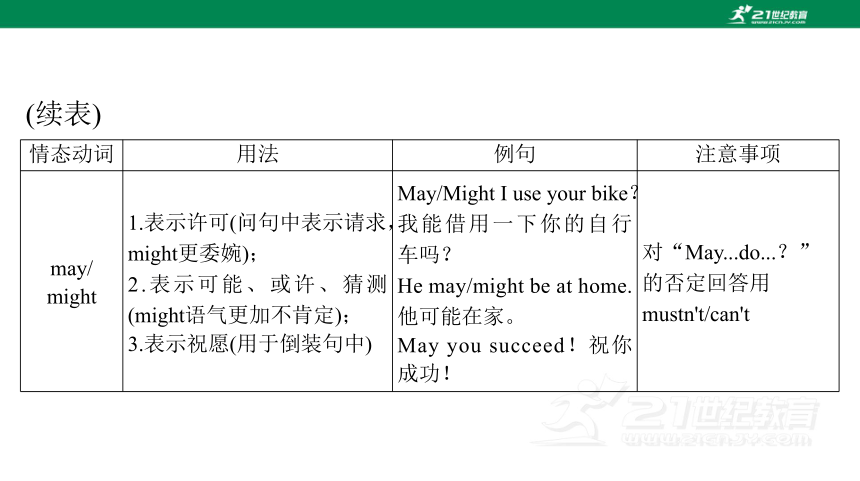
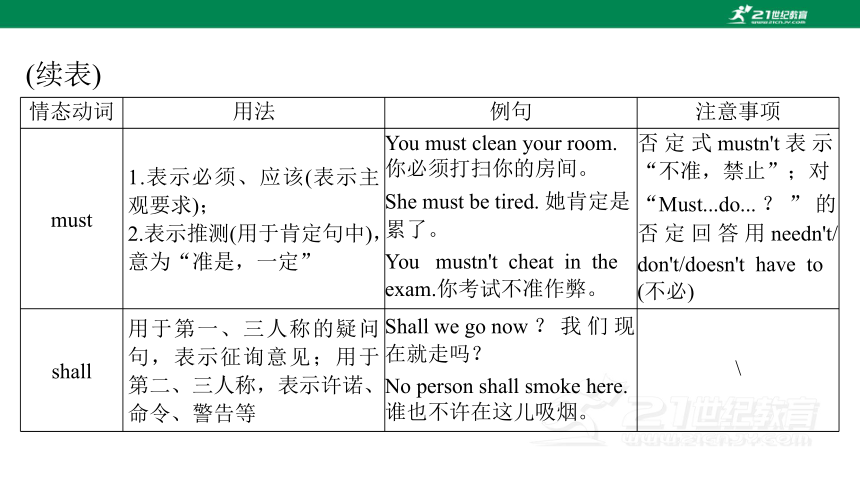
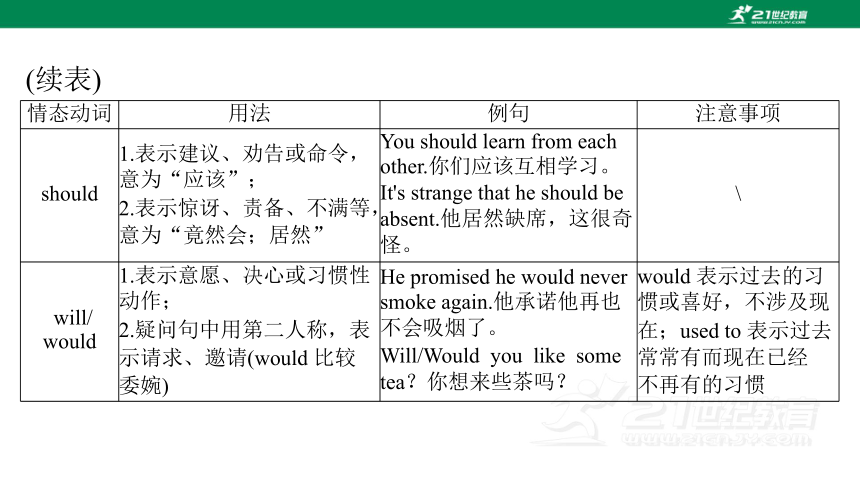
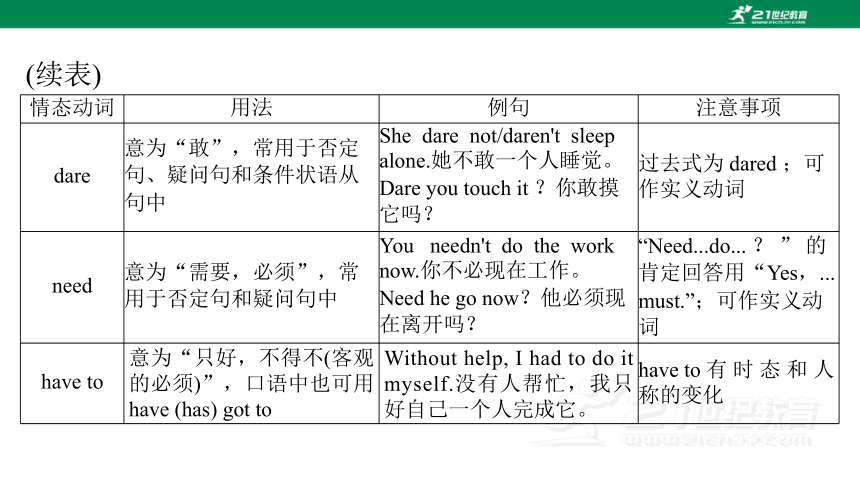
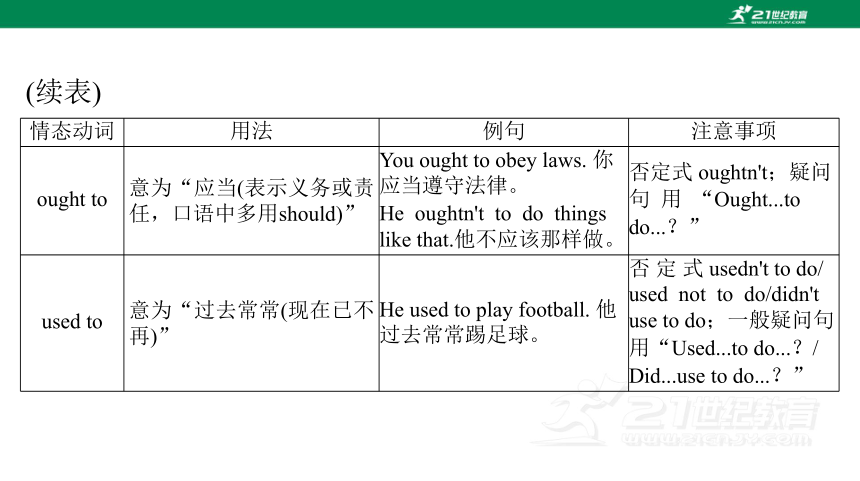
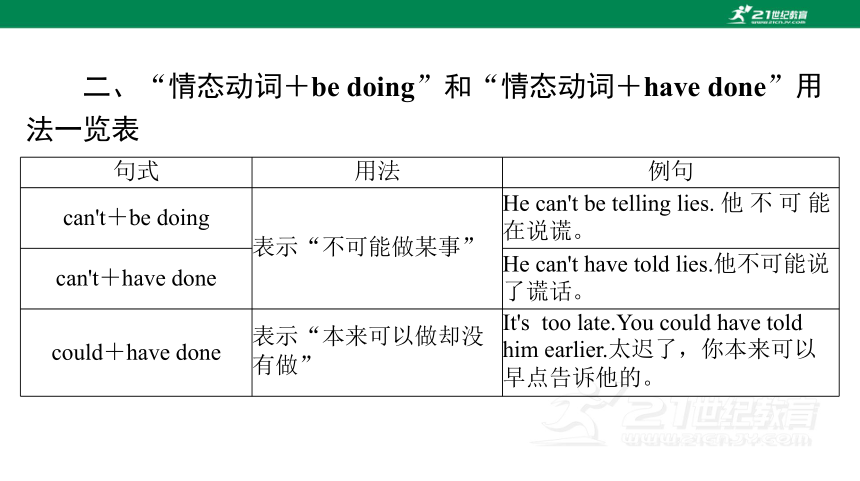
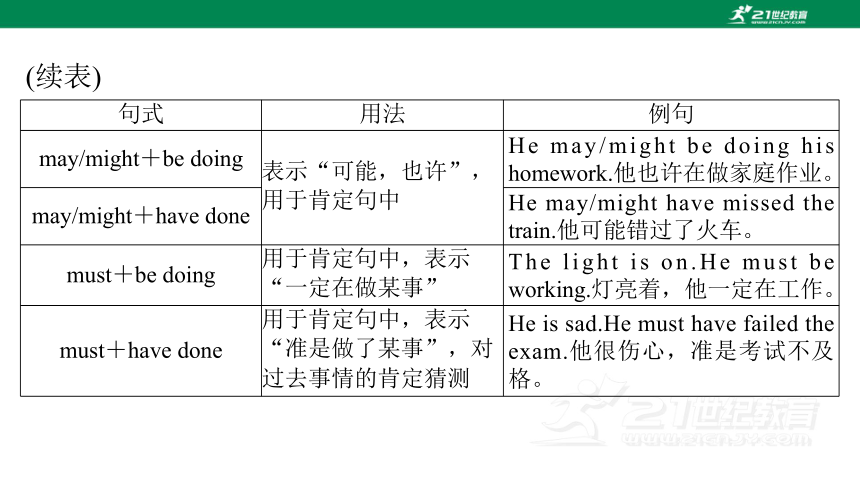
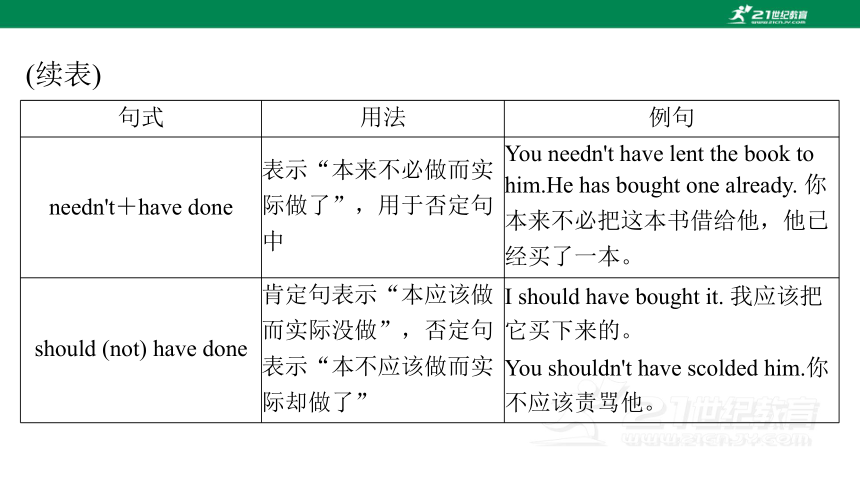
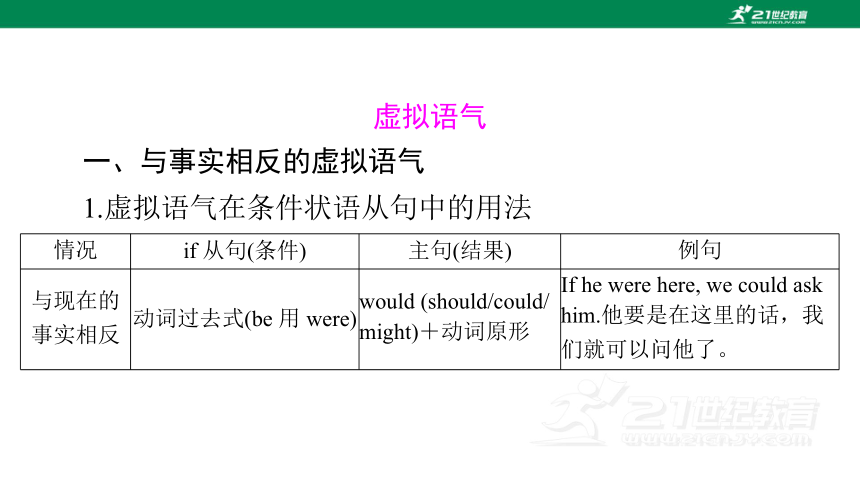
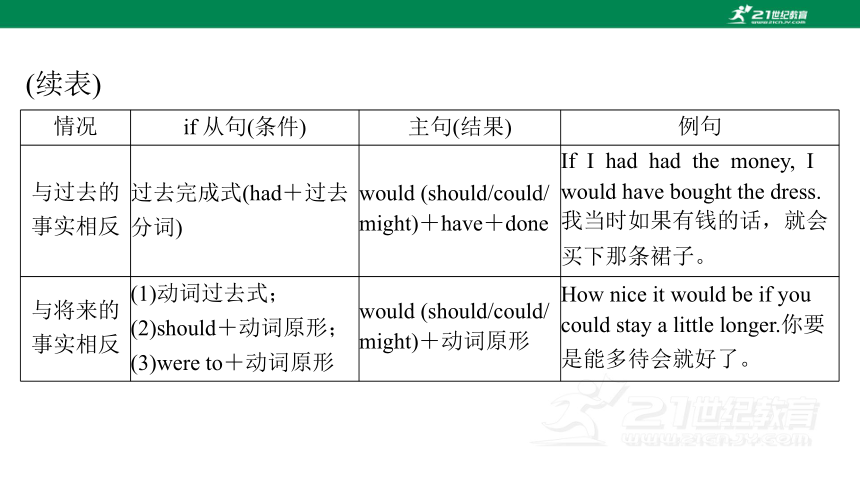
文档简介
(共32张PPT)
第五讲 情态动词和虚拟语气
2025年高考一轮总复习
第二部分 语法专题
情态动词 用法 例句 注意事项
can/
could 1.表示许可(和may可互换)、能力;
2.表示怀疑、猜测、可能性
(用于否定句和疑问句中);
3.could表示比can更委婉的语气及用于虚拟语气 You can/may sit here.你可以坐在这儿。
He can't be sixty.他不可能有60岁。
Could you come again tomorrow?你明天可以再来一趟吗? can和be able to都可表示能力,但be able to表示“终于做成了某事”,有时态和人称的变化
情态动词
一、情态动词基本用法一览表
情态动词 用法 例句 注意事项
may/
might 1.表示许可(问句中表示请求,might更委婉);
2.表示可能、或许、猜测(might语气更加不肯定);
3.表示祝愿(用于倒装句中) May/Might I use your bike?我能借用一下你的自行车吗?
He may/might be at home.他可能在家。
May you succeed!祝你成功! 对“May...do...?”
的否定回答用
mustn't/can't
(续表)
情态动词 用法 例句 注意事项
must 1.表示必须、应该(表示主观要求);
2.表示推测(用于肯定句中),意为“准是,一定” You must clean your room.
你必须打扫你的房间。
She must be tired. 她肯定是
累了。
You mustn't cheat in the
exam.你考试不准作弊。 否 定 式 mustn't 表 示
“不准,禁止”;对
“Must...do... ? ” 的
否 定 回 答 用 needn't/
don't/doesn't have to
(不必)
shall 用于第一、三人称的疑问句,表示征询意见;用于第二、三人称,表示许诺、命令、警告等 Shall we go now ? 我 们 现
在就走吗?
No person shall smoke here.
谁也不许在这儿吸烟。 \
(续表)
情态动词 用法 例句 注意事项
should 1.表示建议、劝告或命令,
意为“应该”;
2.表示惊讶、责备、不满等,
意为“竟然会;居然” You should learn from each
other.你们应该互相学习。
It's strange that he should be
absent.他居然缺席,这很奇
怪。 \
will/
would 1.表示意愿、决心或习惯性
动作;
2.疑问句中用第二人称,表
示请求、邀请(would 比较
委婉) He promised he would never
smoke again.他承诺他再也
不会吸烟了。
Will/Would you like some
tea?你想来些茶吗? would 表示过去的习
惯或喜好,不涉及现
在;used to 表示过去
常常有而现在已经
不再有的习惯
(续表)
情态动词 用法 例句 注意事项
dare 意为“敢”,常用于否定
句、疑问句和条件状语从
句中 She dare not/daren't sleep
alone.她不敢一个人睡觉。
Dare you touch it ?你敢摸
它吗? 过去式为 dared ;可
作实义动词
need 意为“需要,必须”,常
用于否定句和疑问句中 You needn't do the work
now.你不必现在工作。
Need he go now?他必须现
在离开吗? “Need...do... ? ” 的
肯定回答用“Yes,...
must.”;可作实义动
词
have to 意为“只好,不得不(客观的必须)”,口语中也可用have (has) got to Without help, I had to do it myself.没有人帮忙,我只好自己一个人完成它。 have to 有 时 态 和 人
称的变化
(续表)
情态动词 用法 例句 注意事项
ought to 意为“应当(表示义务或责任,口语中多用should)” You ought to obey laws. 你
应当遵守法律。
He oughtn't to do things
like that.他不应该那样做。 否定式 oughtn't;疑问
句 用 “Ought...to
do...?”
used to 意为“过去常常(现在已不再)” He used to play football. 他
过去常常踢足球。 否 定 式 usedn't to do/
used not to do/didn't
use to do;一般疑问句
用“Used...to do...?/
Did...use to do...?”
(续表)
句式 用法 例句
can't+be doing 表示“不可能做某事” He can't be telling lies. 他 不 可 能
在说谎。
can't+have done He can't have told lies.他不可能说
了谎话。
could+have done 表示“本来可以做却没
有做” It's too late.You could have told
him earlier.太迟了,你本来可以
早点告诉他的。
二、“情态动词+be doing”和“情态动词+have done”用
法一览表
句式 用法 例句
may/might+be doing 表示“可能,也许”,
用于肯定句中 He may/might be doing his homework.他也许在做家庭作业。
may/might+have done He may/might have missed the train.他可能错过了火车。
must+be doing 用于肯定句中,表示
“一定在做某事” The light is on.He must be working.灯亮着,他一定在工作。
must+have done 用于肯定句中,表示
“准是做了某事”,对
过去事情的肯定猜测 He is sad.He must have failed the exam.他很伤心,准是考试不及格。
(续表)
句式 用法 例句
needn't+have done 表示“本来不必做而实
际做了”,用于否定句
中 You needn't have lent the book to
him.He has bought one already. 你
本来不必把这本书借给他,他已
经买了一本。
should (not) have done 肯定句表示“本应该做
而实际没做”,否定句
表示“本不应该做而实
际却做了” I should have bought it. 我应该把
它买下来的。
You shouldn't have scolded him.你
不应该责骂他。
(续表)
情况 if 从句(条件) 主句(结果) 例句
与现在的
事实相反 动词过去式(be 用 were) would (should/could/
might)+动词原形 If he were here, we could ask
him.他要是在这里的话,我
们就可以问他了。
虚拟语气
一、与事实相反的虚拟语气
1.虚拟语气在条件状语从句中的用法
情况 if 从句(条件) 主句(结果) 例句
与过去的
事实相反 过去完成式(had+过去
分词) would (should/could/
might)+have+done If I had had the money, I
would have bought the dress.
我当时如果有钱的话,就会
买下那条裙子。
与将来的
事实相反 (1)动词过去式;
(2)should+动词原形;
(3)were to+动词原形 would (should/could/
might)+动词原形 How nice it would be if you
could stay a little longer.你要
是能多待会就好了。
(续表)
2. 常接虚拟语气句型的结构有:as if/though, even if/though,
would rather, if only, wish 等。如:
I would rather you came to see me tomorrow.我宁愿你明天来看
我。
If only I had had more time.我当时要是有更多的时间就好了。
How I wish I were always 20 years old! 我要是一直都是二十
岁该多好啊!
用法 例句 注意事项
表示建议、命令、
要求的名词性从句 It is strongly recommended that the security
rules (should) be obeyed.强烈建议(大家)遵
守安全条例。
Our English teacher suggested that we
(should) practise English more. 我们英语老
师建议我们要多多练习英语。 should 可以省略
二、虚拟语气在其他从句中的用法
用法 例句 注意事项
在“It is important/ necessary/strange/
right/best...that...”
句型中 It is important that every one of us (should)
equip ourselves for the future. 我们要为未
来做好准备,这很重要。
It is best that he (should) not smoke at all.
他最好是完全不吸烟。 should 可以省略
在“It is (high)
time...”句型中 It is high time that we should take effective
measures to protect our environment.=It is
high time that we took effective measures
to protect our environment. 是我们采取有
效措施保护环境的时候了。 从句可以用一般过
去时表虚拟,也可
用情态动词 should
+动词原形 ( 这时
should 不可以省略)
(续表)
三、虚拟语气的注意事项
1.虚拟语气的倒装
在 if 引导的条件状语从句中,如果有 should, were, had 时,可
以省略 if,并将 should, were, had 提到主语前面引起倒装。如:
Had I followed your advice, I would not have made such a silly
mistake.我要是听了你的建议,我就不会犯这么愚蠢的错误了。
Were it not for his help, we would have got lost in the forest.要不
是他的帮助,我们就会在森林里迷路了。
2.混合时态的虚拟语气
在有些句子中,主句和从句动作发生的时间是不一致的,这
时需要根据实际情况来调整。如:
If I had not got caught in the rain yesterday, I would not be in
hospital now.我昨天要是没淋雨,今天就不会住院了。(从句对过去
虚拟,主句对现在虚拟)
If I had done better in the exam, my parents would take me to
Australia for holiday this summer.我这次考试要是考得好一些,我父
母今年暑假就会带我去澳洲度假了。(从句对过去虚拟,主句对将
来虚拟)
3.当 suggest 表示“暗示;表明”时,其后的宾语从句要用陈
述语气。如:
Her pale face suggested that she was ill.她苍白的脸色表明她生
病了。
4.当 insist 表示命令、要求,意为“坚持”,后接宾语从句时,
如果从句中的谓语动词所表示的动作尚未发生,或尚未成为事实,
则从句要用虚拟语气,即“should+动词原形”,其中 should可以
省略。相同用法的动词还有:demand, suggest, order, propose 等。
如果从句中的谓语动词表示的动作已然发生,则从句要用陈
述语气。如:
He insisted that he was not ill, but the doctor insisted that he
(should) take the medicine.他坚持认为自己没有生病,但医生坚持
要他吃药。
5.有的假设情况是以其他形式出现的,即可用 without, but for,
otherwise 等代替虚拟语气条件句。如:
Human could not exist on the earth without water.没有水,人类
不可能在地球上生存。
But for the bad weather, we would have had a good time.要不是
糟糕的天气,我们会玩得很开心。
With your help, we could have finished the task earlier.要是有了
你的帮忙,我们还可以更早地完成任务。
He is ill.Otherwise he would come to your party tonight. 他生病
了。不然他今晚就会参加你的派对。
一、单句语法填空
1.(2023· 全国甲卷 · 语法填空)Carson proves that a simple lyric
form that has been passed down through the ages can still ________
(employ) today to draw attention to important truths.
be employed
考查情态动词的被动语态。句意:卡森证明了
一种简单的抒情形式已经被代代相传,今天仍然可以用来吸引人
们对重要真理的关注。从句主语 a simple lyric form 与动词 employ
之间为被动关系,所以用被动语态。情态动词 can 后接动词原形。
故填 be employed。
2.(2021· 全国甲卷 · 语法填空改编)The wall is 12 metres high
and from here you ________ see streams of people moving inside and
outside the City Wall.
can
考查情态动词。句意:城墙高 12 米。从这里,你可以
看到城墙内外穿梭的人流。从句意可知,此处表示能力。故填 can。
3.________ they abandoned their dreams, they wouldn't have
achieved their success.
Had 考查虚拟语气的倒装句。句意:如果他们放弃了自己的
梦想,他们就不会取得成功。根据主句可知,从句表示与过去事
实相反的虚拟语气,要用 if 引导的条件状语从句,因省略了 if,
故将 had 置于句首,构成过去完成时的倒装句。故填 Had。
4.My mother recommended that the clothes in a mess ________
(fold) up and laid in my wardrobe.
(should) be folded
考查虚拟语气。recommend 后接宾语从句
时要用虚拟语气,从句的谓语动词用“should+动词原形”,should
可以省略。从句主语 clothes 与动词 fold 之间是动宾关系,要用虚
拟语气的被动语态。故填(should) be folded。
5.The manager requested that all the business invitations ______
(send) out before tomorrow.
(should) be sent 考查虚拟语气。句意:经理要求所有的商务
邀请函必须在明天之前发出。request 后接宾语从句时需用虚拟语
气,即 request that+(should) do,should 可以省略,且动词 send
与从句主语 invitations 之间是被动关系。故填(should) be sent。
二、运用情态动词或虚拟语气, 完成下面的句子
6.她看起来年轻了十岁。
She looks ________________ ten years younger.
as if she were 考查虚拟语气。表示与现在事实相反,用一般
过去时,be 动词用 were。故填 as if she were。
7.我建议你找到自己的风格。
I recommend that ________________ find your own style.
you (should)
考查虚拟语气。动词 recommend 作为“建议”
之意,后接宾语从句时,从句用“should+动词原形”的虚拟语气,
should 可以省略。故填 you (should)。
8.她拒绝了他单独做那项工作的请求。
She refused the demand that __________________________ the
work alone.
he (should) do 考查虚拟语气。名词 demand 表示“请求”,
后接 that 引导的同位语从句时,从句需用虚拟语气,谓语部分为
(should) do。故填 he (should) do。
9.我们真心希望有一天人与自然可以和谐相处。(live in
harmony with)
It is our sincere hope that one day man ____________________
nature.
can live in harmony with
考查情态动词。表示“可以”用情
态动词 can,短语 live in harmony with 意为“与……和谐相处”,
接在情态动词后,用动词原形。故填 can live in harmony with。
10.你应该更仔细地完成这个练习。
You ________________________ this exercise more carefully.
should have finished
考查情态动词。根据句意可知,此处表
示本应该做而实际没做。故填 should have finished。
谢谢
21世纪教育网(www.21cnjy.com)
中小学教育资源网站
兼职招聘:
https://www.21cnjy.com/recruitment/home/admin
第五讲 情态动词和虚拟语气
2025年高考一轮总复习
第二部分 语法专题
情态动词 用法 例句 注意事项
can/
could 1.表示许可(和may可互换)、能力;
2.表示怀疑、猜测、可能性
(用于否定句和疑问句中);
3.could表示比can更委婉的语气及用于虚拟语气 You can/may sit here.你可以坐在这儿。
He can't be sixty.他不可能有60岁。
Could you come again tomorrow?你明天可以再来一趟吗? can和be able to都可表示能力,但be able to表示“终于做成了某事”,有时态和人称的变化
情态动词
一、情态动词基本用法一览表
情态动词 用法 例句 注意事项
may/
might 1.表示许可(问句中表示请求,might更委婉);
2.表示可能、或许、猜测(might语气更加不肯定);
3.表示祝愿(用于倒装句中) May/Might I use your bike?我能借用一下你的自行车吗?
He may/might be at home.他可能在家。
May you succeed!祝你成功! 对“May...do...?”
的否定回答用
mustn't/can't
(续表)
情态动词 用法 例句 注意事项
must 1.表示必须、应该(表示主观要求);
2.表示推测(用于肯定句中),意为“准是,一定” You must clean your room.
你必须打扫你的房间。
She must be tired. 她肯定是
累了。
You mustn't cheat in the
exam.你考试不准作弊。 否 定 式 mustn't 表 示
“不准,禁止”;对
“Must...do... ? ” 的
否 定 回 答 用 needn't/
don't/doesn't have to
(不必)
shall 用于第一、三人称的疑问句,表示征询意见;用于第二、三人称,表示许诺、命令、警告等 Shall we go now ? 我 们 现
在就走吗?
No person shall smoke here.
谁也不许在这儿吸烟。 \
(续表)
情态动词 用法 例句 注意事项
should 1.表示建议、劝告或命令,
意为“应该”;
2.表示惊讶、责备、不满等,
意为“竟然会;居然” You should learn from each
other.你们应该互相学习。
It's strange that he should be
absent.他居然缺席,这很奇
怪。 \
will/
would 1.表示意愿、决心或习惯性
动作;
2.疑问句中用第二人称,表
示请求、邀请(would 比较
委婉) He promised he would never
smoke again.他承诺他再也
不会吸烟了。
Will/Would you like some
tea?你想来些茶吗? would 表示过去的习
惯或喜好,不涉及现
在;used to 表示过去
常常有而现在已经
不再有的习惯
(续表)
情态动词 用法 例句 注意事项
dare 意为“敢”,常用于否定
句、疑问句和条件状语从
句中 She dare not/daren't sleep
alone.她不敢一个人睡觉。
Dare you touch it ?你敢摸
它吗? 过去式为 dared ;可
作实义动词
need 意为“需要,必须”,常
用于否定句和疑问句中 You needn't do the work
now.你不必现在工作。
Need he go now?他必须现
在离开吗? “Need...do... ? ” 的
肯定回答用“Yes,...
must.”;可作实义动
词
have to 意为“只好,不得不(客观的必须)”,口语中也可用have (has) got to Without help, I had to do it myself.没有人帮忙,我只好自己一个人完成它。 have to 有 时 态 和 人
称的变化
(续表)
情态动词 用法 例句 注意事项
ought to 意为“应当(表示义务或责任,口语中多用should)” You ought to obey laws. 你
应当遵守法律。
He oughtn't to do things
like that.他不应该那样做。 否定式 oughtn't;疑问
句 用 “Ought...to
do...?”
used to 意为“过去常常(现在已不再)” He used to play football. 他
过去常常踢足球。 否 定 式 usedn't to do/
used not to do/didn't
use to do;一般疑问句
用“Used...to do...?/
Did...use to do...?”
(续表)
句式 用法 例句
can't+be doing 表示“不可能做某事” He can't be telling lies. 他 不 可 能
在说谎。
can't+have done He can't have told lies.他不可能说
了谎话。
could+have done 表示“本来可以做却没
有做” It's too late.You could have told
him earlier.太迟了,你本来可以
早点告诉他的。
二、“情态动词+be doing”和“情态动词+have done”用
法一览表
句式 用法 例句
may/might+be doing 表示“可能,也许”,
用于肯定句中 He may/might be doing his homework.他也许在做家庭作业。
may/might+have done He may/might have missed the train.他可能错过了火车。
must+be doing 用于肯定句中,表示
“一定在做某事” The light is on.He must be working.灯亮着,他一定在工作。
must+have done 用于肯定句中,表示
“准是做了某事”,对
过去事情的肯定猜测 He is sad.He must have failed the exam.他很伤心,准是考试不及格。
(续表)
句式 用法 例句
needn't+have done 表示“本来不必做而实
际做了”,用于否定句
中 You needn't have lent the book to
him.He has bought one already. 你
本来不必把这本书借给他,他已
经买了一本。
should (not) have done 肯定句表示“本应该做
而实际没做”,否定句
表示“本不应该做而实
际却做了” I should have bought it. 我应该把
它买下来的。
You shouldn't have scolded him.你
不应该责骂他。
(续表)
情况 if 从句(条件) 主句(结果) 例句
与现在的
事实相反 动词过去式(be 用 were) would (should/could/
might)+动词原形 If he were here, we could ask
him.他要是在这里的话,我
们就可以问他了。
虚拟语气
一、与事实相反的虚拟语气
1.虚拟语气在条件状语从句中的用法
情况 if 从句(条件) 主句(结果) 例句
与过去的
事实相反 过去完成式(had+过去
分词) would (should/could/
might)+have+done If I had had the money, I
would have bought the dress.
我当时如果有钱的话,就会
买下那条裙子。
与将来的
事实相反 (1)动词过去式;
(2)should+动词原形;
(3)were to+动词原形 would (should/could/
might)+动词原形 How nice it would be if you
could stay a little longer.你要
是能多待会就好了。
(续表)
2. 常接虚拟语气句型的结构有:as if/though, even if/though,
would rather, if only, wish 等。如:
I would rather you came to see me tomorrow.我宁愿你明天来看
我。
If only I had had more time.我当时要是有更多的时间就好了。
How I wish I were always 20 years old! 我要是一直都是二十
岁该多好啊!
用法 例句 注意事项
表示建议、命令、
要求的名词性从句 It is strongly recommended that the security
rules (should) be obeyed.强烈建议(大家)遵
守安全条例。
Our English teacher suggested that we
(should) practise English more. 我们英语老
师建议我们要多多练习英语。 should 可以省略
二、虚拟语气在其他从句中的用法
用法 例句 注意事项
在“It is important/ necessary/strange/
right/best...that...”
句型中 It is important that every one of us (should)
equip ourselves for the future. 我们要为未
来做好准备,这很重要。
It is best that he (should) not smoke at all.
他最好是完全不吸烟。 should 可以省略
在“It is (high)
time...”句型中 It is high time that we should take effective
measures to protect our environment.=It is
high time that we took effective measures
to protect our environment. 是我们采取有
效措施保护环境的时候了。 从句可以用一般过
去时表虚拟,也可
用情态动词 should
+动词原形 ( 这时
should 不可以省略)
(续表)
三、虚拟语气的注意事项
1.虚拟语气的倒装
在 if 引导的条件状语从句中,如果有 should, were, had 时,可
以省略 if,并将 should, were, had 提到主语前面引起倒装。如:
Had I followed your advice, I would not have made such a silly
mistake.我要是听了你的建议,我就不会犯这么愚蠢的错误了。
Were it not for his help, we would have got lost in the forest.要不
是他的帮助,我们就会在森林里迷路了。
2.混合时态的虚拟语气
在有些句子中,主句和从句动作发生的时间是不一致的,这
时需要根据实际情况来调整。如:
If I had not got caught in the rain yesterday, I would not be in
hospital now.我昨天要是没淋雨,今天就不会住院了。(从句对过去
虚拟,主句对现在虚拟)
If I had done better in the exam, my parents would take me to
Australia for holiday this summer.我这次考试要是考得好一些,我父
母今年暑假就会带我去澳洲度假了。(从句对过去虚拟,主句对将
来虚拟)
3.当 suggest 表示“暗示;表明”时,其后的宾语从句要用陈
述语气。如:
Her pale face suggested that she was ill.她苍白的脸色表明她生
病了。
4.当 insist 表示命令、要求,意为“坚持”,后接宾语从句时,
如果从句中的谓语动词所表示的动作尚未发生,或尚未成为事实,
则从句要用虚拟语气,即“should+动词原形”,其中 should可以
省略。相同用法的动词还有:demand, suggest, order, propose 等。
如果从句中的谓语动词表示的动作已然发生,则从句要用陈
述语气。如:
He insisted that he was not ill, but the doctor insisted that he
(should) take the medicine.他坚持认为自己没有生病,但医生坚持
要他吃药。
5.有的假设情况是以其他形式出现的,即可用 without, but for,
otherwise 等代替虚拟语气条件句。如:
Human could not exist on the earth without water.没有水,人类
不可能在地球上生存。
But for the bad weather, we would have had a good time.要不是
糟糕的天气,我们会玩得很开心。
With your help, we could have finished the task earlier.要是有了
你的帮忙,我们还可以更早地完成任务。
He is ill.Otherwise he would come to your party tonight. 他生病
了。不然他今晚就会参加你的派对。
一、单句语法填空
1.(2023· 全国甲卷 · 语法填空)Carson proves that a simple lyric
form that has been passed down through the ages can still ________
(employ) today to draw attention to important truths.
be employed
考查情态动词的被动语态。句意:卡森证明了
一种简单的抒情形式已经被代代相传,今天仍然可以用来吸引人
们对重要真理的关注。从句主语 a simple lyric form 与动词 employ
之间为被动关系,所以用被动语态。情态动词 can 后接动词原形。
故填 be employed。
2.(2021· 全国甲卷 · 语法填空改编)The wall is 12 metres high
and from here you ________ see streams of people moving inside and
outside the City Wall.
can
考查情态动词。句意:城墙高 12 米。从这里,你可以
看到城墙内外穿梭的人流。从句意可知,此处表示能力。故填 can。
3.________ they abandoned their dreams, they wouldn't have
achieved their success.
Had 考查虚拟语气的倒装句。句意:如果他们放弃了自己的
梦想,他们就不会取得成功。根据主句可知,从句表示与过去事
实相反的虚拟语气,要用 if 引导的条件状语从句,因省略了 if,
故将 had 置于句首,构成过去完成时的倒装句。故填 Had。
4.My mother recommended that the clothes in a mess ________
(fold) up and laid in my wardrobe.
(should) be folded
考查虚拟语气。recommend 后接宾语从句
时要用虚拟语气,从句的谓语动词用“should+动词原形”,should
可以省略。从句主语 clothes 与动词 fold 之间是动宾关系,要用虚
拟语气的被动语态。故填(should) be folded。
5.The manager requested that all the business invitations ______
(send) out before tomorrow.
(should) be sent 考查虚拟语气。句意:经理要求所有的商务
邀请函必须在明天之前发出。request 后接宾语从句时需用虚拟语
气,即 request that+(should) do,should 可以省略,且动词 send
与从句主语 invitations 之间是被动关系。故填(should) be sent。
二、运用情态动词或虚拟语气, 完成下面的句子
6.她看起来年轻了十岁。
She looks ________________ ten years younger.
as if she were 考查虚拟语气。表示与现在事实相反,用一般
过去时,be 动词用 were。故填 as if she were。
7.我建议你找到自己的风格。
I recommend that ________________ find your own style.
you (should)
考查虚拟语气。动词 recommend 作为“建议”
之意,后接宾语从句时,从句用“should+动词原形”的虚拟语气,
should 可以省略。故填 you (should)。
8.她拒绝了他单独做那项工作的请求。
She refused the demand that __________________________ the
work alone.
he (should) do 考查虚拟语气。名词 demand 表示“请求”,
后接 that 引导的同位语从句时,从句需用虚拟语气,谓语部分为
(should) do。故填 he (should) do。
9.我们真心希望有一天人与自然可以和谐相处。(live in
harmony with)
It is our sincere hope that one day man ____________________
nature.
can live in harmony with
考查情态动词。表示“可以”用情
态动词 can,短语 live in harmony with 意为“与……和谐相处”,
接在情态动词后,用动词原形。故填 can live in harmony with。
10.你应该更仔细地完成这个练习。
You ________________________ this exercise more carefully.
should have finished
考查情态动词。根据句意可知,此处表
示本应该做而实际没做。故填 should have finished。
谢谢
21世纪教育网(www.21cnjy.com)
中小学教育资源网站
兼职招聘:
https://www.21cnjy.com/recruitment/home/admin
